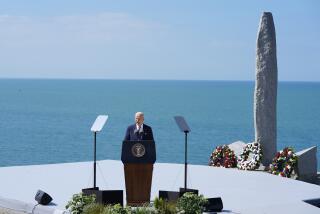Reagan Likens Grenada Action to Liberation of France
- Share via
WASHINGTON — President Reagan, marking the fifth anniversary of the U.S. invasion of Grenada, Tuesday likened the operation to the liberation of France during World War II, saying it put the United States “back into freedom’s battles.”
In a speech before he signed legislation giving Cabinet rank to the Veterans Administration, Reagan spoke proudly of the controversial mission, detailing its coordinated land, air and sea operations and lauding the “courage and resourcefulness” of the U.S. forces.
Reagan recounted how Army Rangers who were pinned down by Cuban soldiers and construction workers “commandeered a bulldozer and used it as a makeshift tank” and how “a small unit of commandos . . . battled a much larger Cuban contingent” to rescue a Grenadian official.
‘Acts of Kindness’
“Yet, most of us haven’t heard about the thousands of acts of kindness and generosity that our men did for the people of the island during and after the fighting,” Reagan told his audience at the National Defense University at Ft. McNair, where the bill-signing ceremony took place.
”. . . When it came time for the last American force to leave Grenada, the Grenadian people didn’t want our men in uniform to go,” he said. “Yes, the people of Grenada treated our forces the way the people of France treated American liberators of another generation. And we’re proud of that.”
The Grenada invasion has been cited frequently during the current presidential campaign as a litmus test of the two candidates’ willingness to use American forces overseas.
Vice President George Bush, who was involved in planning the operation, has asserted repeatedly that he would send U.S. troops on such missions if Americans in a foreign country were in danger. The campaign of Democratic nominee Michael S. Dukakis, whom Bush has blasted for being critical of the invasion, has insisted that he, too, would authorize such an action, but only if he firmly believed that the threat to American lives was real.
In dispatching a force of 1,900 combat troops to Grenada, Reagan cited Cuban and Soviet influence on the tiny island and a bloody coup that he said threatened the safety of hundreds of U.S. medical students there. Since the operation, the actual danger to the students has been debated.
In his speech, Reagan repeated his assertion about the students’ safety and about the “Marxist regime” that had overthrown the government. He likened the U.S. operation to the Allied invasion of France in June, 1944, that dislodged German occupation forces. More than 100,000 Allied troops were put ashore in the first two days of that campaign.
After years of isolationism because of the bitter Vietnam War experience, he said, the Grenada landing marked a turning point in which “America at last stepped back into freedom’s battles. And in the years since, we’ve stayed there.”
Reagan defended U.S. aid to “freedom fighters” in Afghanistan, Angola and Cambodia, asserting that his policies have forced the Soviets and their allies to agree to withdrawals in those countries.
“We could be seeing the same seeds of genuine peace and freedom sprouting in Nicaragua today if we had shown the same steadfast support for the freedom fighters’ cause,” Reagan said.
In signing the legislation creating the Department of Veterans Affairs, Reagan said the debt to military men and women does not end “the day the uniform comes off.”
The department’s new status will take effect March 15. It will continue to oversee benefits for some 27 million veterans and 49 million dependents.
More to Read
Sign up for Essential California
The most important California stories and recommendations in your inbox every morning.
You may occasionally receive promotional content from the Los Angeles Times.








